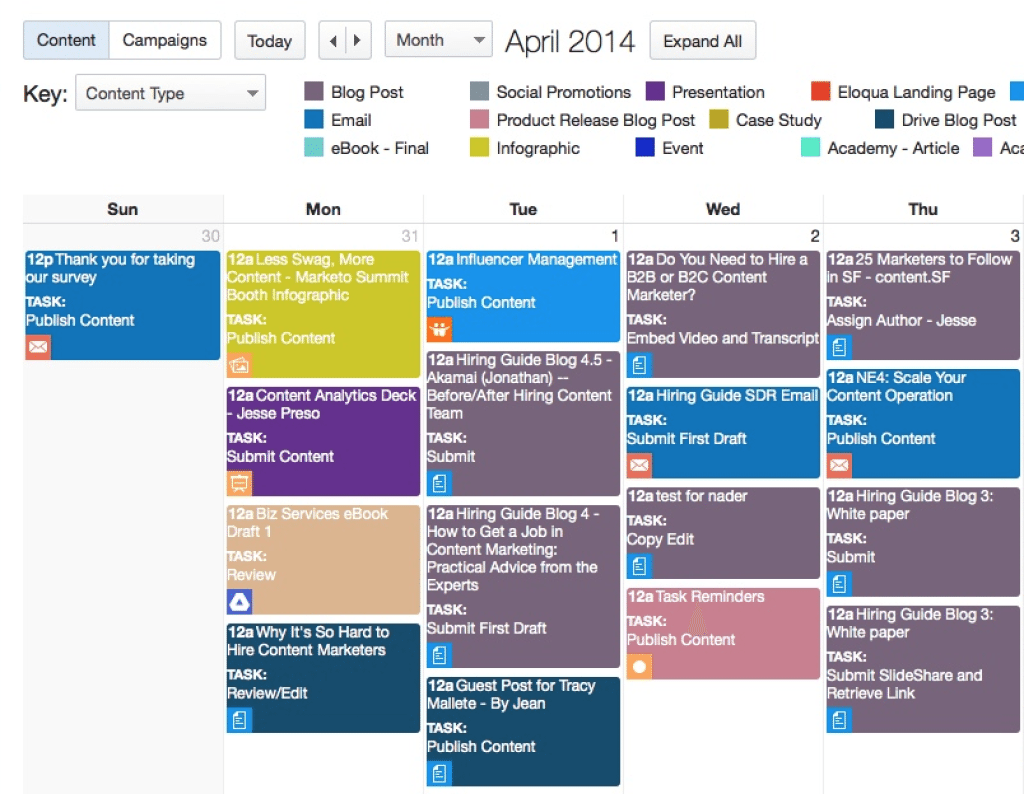Creating a Content Calendar for Your CPA Firm
Whether you're part of a large firm or a one-person shop, publishing content frequently is a great way to generate new clients. However, it can be challenging to constantly create blogs, social media posts, newsletters, and emails without a plan. The easiest way to ensure you stay on track is to create a content calendar for your accounting firm.
What is a Content Calendar?
A content calendar is a strategic marketing tool to help structure the content creation process. It may be easier to picture the calendar as a schedule that outlines when and what content your team needs to publish across various platforms.
Since most small businesses and accounting firms don't have large marketing teams, creating structure and easily replicable processes is even more crucial.
In general, a firm's content calendar will include the following information:
-
Types of content
-
Content ideas
-
Checklists
-
Marketing channels
-
Dates
-
Process owners
What is the Most Commonly Used Format for a Content Calendar?
Generally, there are two formats accounting firms can use when creating a content calendar: spreadsheets or project management software. Both options have advantages and disadvantages, depending on the experience your team is looking for.
Spreadsheet Content Calendars

Spreadsheet content calendars offer greater flexibility when it comes to labeling. Instead of choosing from a predetermined list, your team can create as many rows or columns with any label you like. However, even though spreadsheets are flexible, they tend to lack the design element.
So, if you want a functional content calendar with a solid design, you may want to consider project management software.
Project Management Content Calendars

The other option is to use project management software to create a content calendar. Although these options are less flexible, most platforms already have pre-built calendars you can start using immediately.
What is a Social Media Content Calendar?
Social media calendars are very similar to content calendars as they provide a structured way for your team to plan, manage, and create social media posts. One of the biggest differences between the two calendars is the type of labeling and categories in the tool.
For example, most social media calendars will include the following components:
-
Which social media platforms are you posting to (LinkedIn, Facebook, Instagram, etc..)
-
Key hashtags you plan to use with posts
-
A list of social media accounts your team is posting from
-
Social media post ideas
Overall, an effective social media marketing strategy requires a content calendar.
Why is a Content Calendar Important for Accountants?
Content calendars can be an incredible tool for accounting firms and independent CPAs. The main benefit of using a content calendar for your accounting business is that it allows you to plan while staying organized.
Often, the biggest challenge with a successful content strategy isn't creating the content but finding the time to produce and publish it. Utilizing a content calendar can allow you to work weeks in advance and stay on track with your goals.
So, instead of rushing to create educational content for LinkedIn at the last minute, your team can craft the message ahead of time.
Your team can use content calendars to help with any of the following areas:
-
SEO
-
Case studies
-
Social media management
-
Webinars
-
Podcasts
-
Infographics
Is it to Build Brand Awareness or Generate Leads?
Incorporating content marketing and calendars into your digital marketing strategy can help build brand awareness and generate leads. Content marketing tools can help you identify quality content opportunities that apply to the right audiences.
Content calendars also make it easier to generate high-quality copy that helps convert potential clients into new customers.
What Should You Include in Your Accounting Firm Content Calendar?
Many accountants assume they can copy a content calendar from an online resource and use it for their firm. While the structure might guide you, creating a content calendar that works for your team is essential.
Some organizations want more granular details and choose to add metrics like project status, copy status, or design status. Other accounting firms focus more on the approval process and assign employees to various content tasks for each project.
Regardless of how in-depth your content calendar is, you want to ensure it works for your firm and offers value.
3 Important Steps to Creating a Successful Content Calendar for Your Accounting Firm
Tip #1 — Identify Channels
Not every channel is relevant to your organization. For instance, if you don't have a team member who is comfortable speaking in front of a camera, investing time into creating content for YouTube wouldn't be a good idea.
However, it is important to build your content marketing channels around verticals where your audience is active. Many accounting firms find Facebook a great place to engage with current and prospective clients.
If that's your organization, creating a strategy focusing on different social media posts would be the most effective way to improve your social media presence.
Tip #2 — Establish a Cadence
Once you've chosen the channels you want to use to share your content, it's time to establish a posting cadence. Most accountants assume they must create new posts daily, but that isn't the case.
Posting 3 to 5 times a week on social media and once a week on the blog can sometimes be enough to move the needle. However, it's important to analyze the data you receive every month. You may need to post more frequently if competing in a saturated marketplace or trying to rank for competitive keywords.
Tip #3 — Create a Template
While this step is optional, creating a template will save time and resources when planning your content each month or quarter. One of the easiest ways to create a template is to use Excel or Google Sheets. After you build the initial content calendar, it's easy to make a copy each month and fill in the appropriate information.
How Can an Accounting Firm Use a Content Calendar to Improve Their Online Presence?

Whether you're running a marketing campaign to improve brand awareness or generate leads, everything you do online will shape how your target audience views the firm.
For example, establishing a community engagement element in your content calendar is important if you're looking to make new connections within the local community. You could add a column identifying two to three local businesses you want to tag in posts.
Should You Outsource The Creation of a Content Calendar?
Creating a content calendar for your accounting business is time-consuming and should be thoroughly thought through. While it's possible to build the asset on your own, there are benefits to working with a professional content marketing company like DDS Creative.
For instance, content calendars must integrate various content types into a cohesive content marketing strategy. So, what you write for your blog must pair well with what you share on social media. Without symmetry, your marketing efforts could be ineffective and costly.
Overall, establishing a content calendar for your accounting firm is a significant resource investment that could prove to be the difference between hitting your lead generation numbers for the quarter or missing the sales quota for the year.



